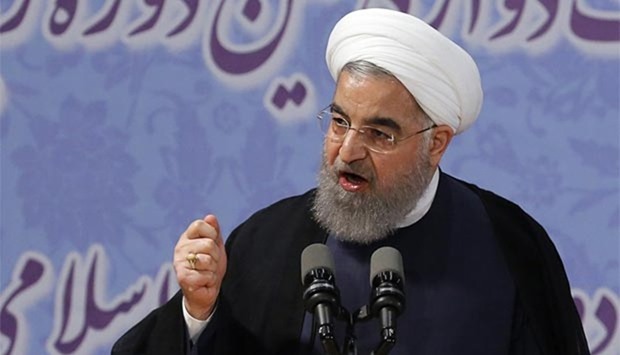Iran's President Hassan Rouhani registered on Friday for next month's election, facing a tougher-than-expected battle thanks to widespread criticism over his handling of the economy.
Rouhani, a politically moderate cleric, inherited an economy in freefall and a country dangerously isolated over its nuclear programme when he took power in 2013. He retains the support of moderate and reformist lawmakers for taming inflation and reaching a landmark nuclear deal with world powers that ended many sanctions.
But disappointment with the 68-year-old's administration is palpable on the streets of Iran.
Unemployment is stuck at 12%, the promised billions in foreign investment have not materialised, and he has failed to ease social restrictions or release political prisoners, including reformist leaders under house arrest for their part in 2009 protests.
After registering for the election at the interior ministry, Rouhani pushed back against hardliners who have criticised the nuclear deal and his efforts to reach out to the West.
"The preservation of the (nuclear deal) is one of the most important political and economic issues in the Iranian nation. The stepmothers who repeatedly tried to kill this baby cannot be good custodians for it," he told reporters.
He said an "unprecedented" $20bn worth of new projects would be announced next week.
That follows government plans, outlined this week, to triple or even quadruple cash hand-outs to the poor -- a move immediately criticised by opponents as a transparent attempt to buy votes.
Ardavan Amir-Aslani, a French-Iranian lawyer who advises European companies setting up in Iran, said he would be surprised if Rouhani does not win re-election despite the economic malaise.
"He has at least stabilised the economy... and created a better business environment," he told AFP.
But he "has not been successful in opening up foreign investment. Buying planes is good, but how many Iranians can afford to fly to Paris?" Amir-Aslani added, referring to recent purchases of Airbus and Boeing planes that have been among the few concrete results of the nuclear deal.
"He inherited a bad situation, but he created so much expectation and nothing has changed for the guy on the street."
The stagnation, which has prompted criticism from supreme leader Ayatollah Ali Khamenei, has boosted Iran's conservatives, who also point to the aggressive rhetoric from US President Donald Trump as a sign that Rouhani's diplomatic efforts have failed.
The conservatives remain divided, but attention has lately focused on hardline cleric Ebrahim Raisi, 56, who runs the powerful Imam Reza charitable foundation. He has emphasised his concern for the poor, and is seen as a close ally of the supreme leader.
Former hardline president Mahmoud Ahmadinejad took the shock move on Wednesday of registering for the election, going against the advice of the supreme leader.
Rouhani has lost one of his main backers. Heavyweight former president Akbar Hashemi Rafsanjani, who passed away in January, played a key role in the surprising landslide victory in 2013.
But, crucially, Rouhani retains the unified support of moderates and reformists, who still see him as the best hope for change within the strict parameters of Iran's Islamic system.
The next question is whether he will be approved by the conservative-controlled Guardian Council, who will vet the hundreds of registered hopefuls over the coming week, with the election due on May 19.

